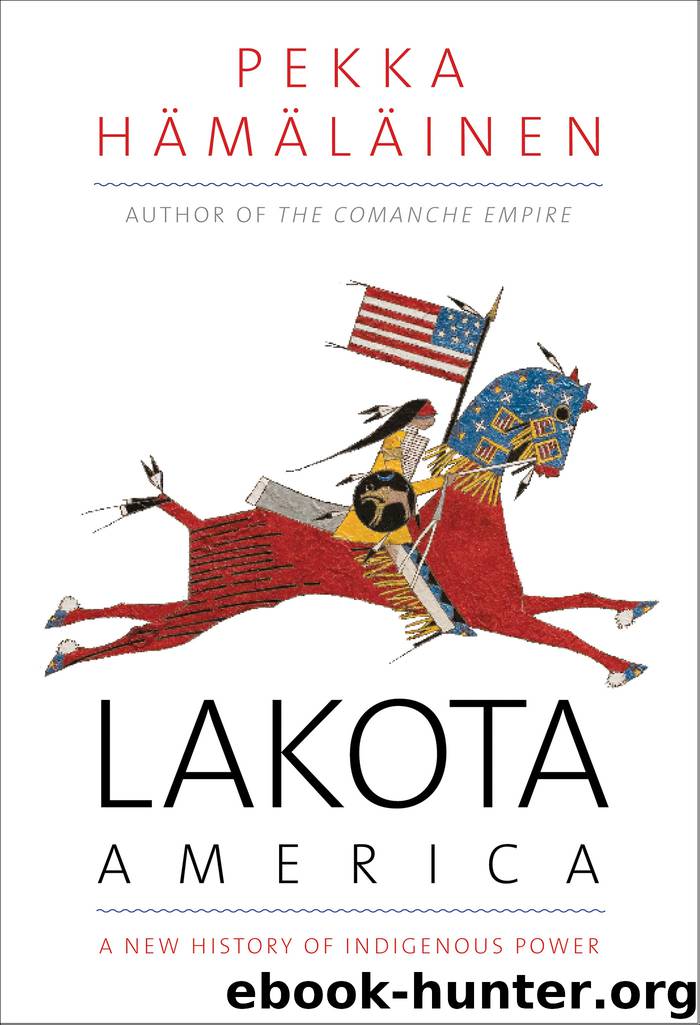Lakota America by Pekka Hamalainen

Author:Pekka Hamalainen
Language: eng
Format: epub
Publisher: Yale University Press
Published: 2019-02-25T16:00:00+00:00
PUNISHED WITH VINDICTIVE EARNESTNESS
The battle had been fought over specific disputes with clear objectives. The U.S. Army wanted to secure free movement along the Bozeman Trail with forts, and the Indians wanted to get rid of both the emigrants and the forts to protect their “last, best hunting grounds.” Lakotas and their allies had simply outwitted the army, but Americans immediately exoticized the battle as an atrocity beyond the pale. Fetterman, a Civil War combat veteran, became the symbol of a disaster that became known as the “Fetterman Massacre,” a morally charged cry of victimhood that silenced Lakotas’ reasons to fight and demonized them as murderous heathens. Humiliated, the army demanded revenge, and the government recognized a grave threat to the westward course of the empire. The forts would stay and the war would continue. Major General Grenville Dodge, one of the Civil War heroes of the Battle of Atlanta two years earlier, was assigned to pacify the Natives. He asked General William Tecumseh Sherman, commander of the vast Military Division of the Missouri, to send ten thousand troops to the West.68
The Fetterman Fight, the army’s greatest defeat in the West as yet, should have been a lesson, but its emotional aftermath centered more on culpability than tactics. The army’s heralded scientific approach to war dissipated into tetchy mudslinging. Carrington claimed that Fetterman, yearning to fight, had disobeyed his orders by crossing the Lodge Trail Ridge, but General Philip St. George Cooke, commander of the Department of the Platte, relieved Carrington from his post, only to be soon relieved himself by Commanding General Ulysses S. Grant who needed a scapegoat. Congress called for an investigation of the Fetterman disaster, and President Andrew Johnson appointed a high-powered special commission to conduct one under the direction of the secretary of the Interior. Careers and reputations were at stake, and emotions ran high.69
The search for guilty parties politicized and polarized the United States’ Lakota policy, exposing old divisions between federal officials and army officers. One of the commission members, N. B. Buford, described the Fetterman Fight as “horrible,” only to ask whether the invasion was “justifiable” and “in accordance with the laws and established customs of our intercourse with the aborigines[.] Have they not been treated as dependent nations?” Starting in April 1867 the commissioners met with Spotted Tail and other treaty chiefs, distributed more than three thousand dollars worth of horses, goods, and provisions, and, stunningly, “assigned them for the present for their hunting grounds all the country south of the Platte and north of the Smoky Hill route.” It was a huge swath of land—a startled Spotted Tail declared that not all of it was “ours”—and may well have convinced many Lakotas of a wašíču capitulation. Indeed, anticipating an imminent extension of the Union Pacific Railroad to the base of the Rockies, Buford announced the Bozeman Trail “unnecessary” and insisted that “there is no necessity for an Indian war.” Relying on a different arithmetic, Sherman articulated the army’s position with ruthless
Download
This site does not store any files on its server. We only index and link to content provided by other sites. Please contact the content providers to delete copyright contents if any and email us, we'll remove relevant links or contents immediately.
| African-American Studies | Asian American Studies |
| Disabled | Ethnic Studies |
| Hispanic American Studies | LGBT |
| Minority Studies | Native American Studies |
Cecilia; Or, Memoirs of an Heiress — Volume 1 by Fanny Burney(31376)
Cecilia; Or, Memoirs of an Heiress — Volume 3 by Fanny Burney(30969)
Cecilia; Or, Memoirs of an Heiress — Volume 2 by Fanny Burney(30923)
The Great Music City by Andrea Baker(22458)
We're Going to Need More Wine by Gabrielle Union(18111)
Bombshells: Glamour Girls of a Lifetime by Sullivan Steve(13142)
Pimp by Iceberg Slim(12976)
All the Missing Girls by Megan Miranda(12814)
Fifty Shades Freed by E L James(12479)
Talking to Strangers by Malcolm Gladwell(11956)
Norse Mythology by Gaiman Neil(11942)
Crazy Rich Asians by Kevin Kwan(8396)
Mindhunter: Inside the FBI's Elite Serial Crime Unit by John E. Douglas & Mark Olshaker(7875)
The Lost Art of Listening by Michael P. Nichols(6514)
Enlightenment Now: The Case for Reason, Science, Humanism, and Progress by Steven Pinker(6435)
Bad Blood by John Carreyrou(5801)
The Four Agreements by Don Miguel Ruiz(5552)
Weapons of Math Destruction by Cathy O'Neil(5080)
We Need to Talk by Celeste Headlee(4906)
